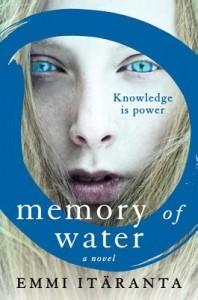Title: Memory of Water
Author: Emmi Itäranta
ISBN: 9780062326157
No. of Pages: 272
Genre: Speculative Fiction
Origins: Harper Voyager
Release Date: 10 June 2014
Bottom Line: More of an ecological warning
 Synopsis:
Synopsis:
“In the far north of the Scandinavian Union, now occupied by the power state of New Qian, seventeen-year-old Noria Kaitio studies to become a tea master like her father. It is a position that holds great responsibility and a dangerous secret. Tea masters alone know the location of hidden water sources, including the natural spring that once provided water for her whole village. When Noria’s father dies, the secret of the spring reaches the new military commander . . . and the power of the army is vast indeed. But the precious water reserve is not the only forbidden knowledge Noria possesses, and resistance is a fine line.
Threatened with imprisonment, and with her life at stake, Noria must make an excruciating, dangerous choice between knowledge and freedom.”
Thoughts: There is nothing about Memory of Water that is far-fetched or difficult to fathom. China could in fact become a globally dominant country. The world could separate into distinct unions separated by geography and occupied by the major power sources. Yet, the true heart of the story is a slap in the face regarding the dire consequences of global warming. Not only does Itäranta show the lasting impact on weather patterns, economies, and inhabitable geography, it also details the damage our current garbage is doing to our environment. The descriptions of the piles and piles of plastic – those items that will never decompose and are still easily identifiable after all those years – are downright frightening.
Noria is an intriguing character. Unlike other dystopian heroines, she lives a life of privilege. She has ready access to water. Her position as the daughter of a Tea Master gives her more influence and also grants her access to more and better food. She is, in many ways, very spoiled. True, she shares her water when the secret is out, but she does not do so willingly. There is a sense of reluctance in the beginning and a feeling of coercion that she has to do so in order to avoid getting in trouble with the police state. For all her altruistic impulses, she remains more concerned about her family’s secrets and traditions than she does about fighting against the system.
Given the slow-moving nature of the story and the massive amounts of world-building to clearly establish this future version of Scandinavia, one cannot help but think that this focus on the damage done to the ecosystem and the resultant scramble for water/power is the point of the novel. The major dystopian elements of Noria’s world are avoidable, and Itäranta is trying to show readers just that. Yes, Noria’s story is interesting for its foreignness and her willingness to stand firm to her beliefs, but it is what is happening outside her sphere of influence that is truly intriguing. The scientific exploration Noria discovers on the CDs, the unique uses for the junk plastic, the structure of society, the huge Chinese influence half a world away – the sheer magnitude of the changes that are a direct result of global warming and the melting of the polar ice caps are more fascinating and chilling because of their implication of past society’s inability to properly conserve and protect the environment. Memory of Water is impressive in the warning it presents rather than the story it tells of a world gone dry.
